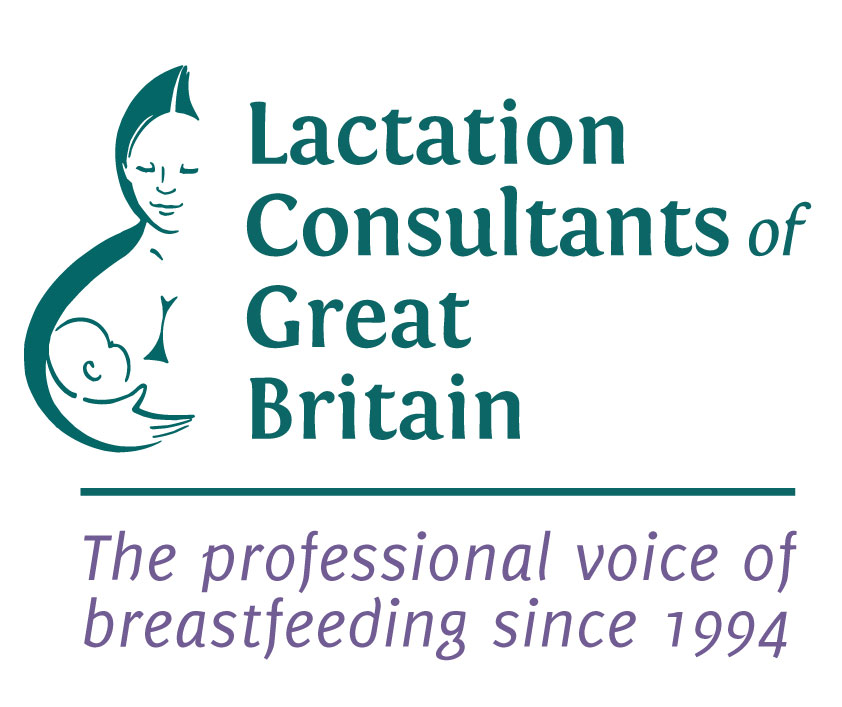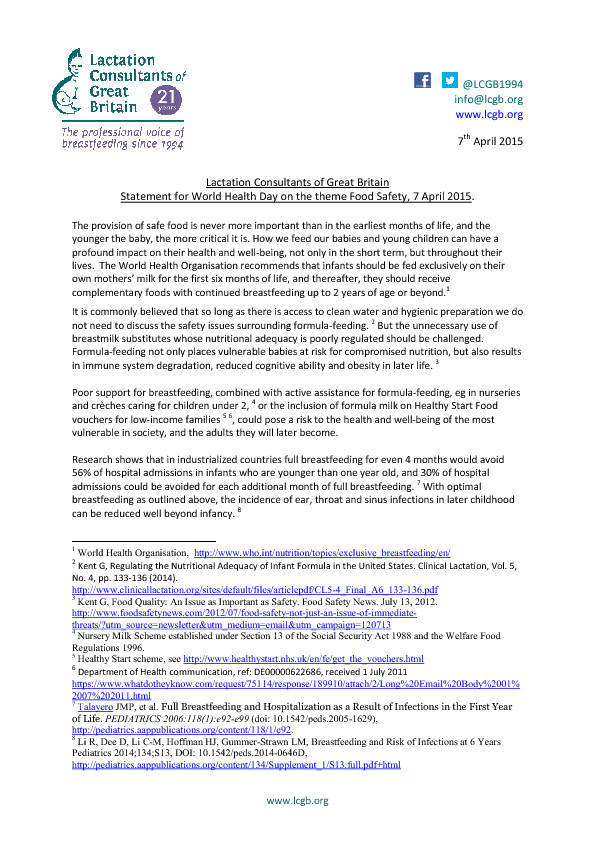Lactation Consultants of Great Britain
Statement for World Health Day on the theme Food Safety, 7 April 2015.
The provision of safe food is never more important than in the earliest months of life, and the younger the baby, the more critical it is. How we feed our babies and young children can have a profound impact on their health and well-being, not only in the short term, but throughout their lives. The World Health Organisation recommends that infants should be fed exclusively on their own mothers’ milk for the first six months of life, and thereafter, they should receive complementary foods with continued breastfeeding up to 2 years of age or beyond.[1]
It is commonly believed that so long as there is access to clean water and hygienic preparation we do not need to discuss the safety issues surrounding formula-feeding. [2] But the unnecessary use of breastmilk substitutes whose nutritional adequacy is poorly regulated should be challenged. Formula-feeding not only places vulnerable babies at risk for compromised nutrition, but also results in immune system degradation, reduced cognitive ability and obesity in later life. [3]
Poor support for breastfeeding, combined with active assistance for formula-feeding, eg in nurseries and crèches caring for children under 2, [4] or the inclusion of formula milk on Healthy Start Food vouchers for low-income families [5] [6], could pose a risk to the health and well-being of the most vulnerable in society, and the adults they will later become.
Research shows that in industrialized countries full breastfeeding for even 4 months would avoid 56% of hospital admissions in infants who are younger than one year old, and 30% of hospital admissions could be avoided for each additional month of full breastfeeding. [7] With optimal breastfeeding as outlined above, the incidence of ear, throat and sinus infections in later childhood can be reduced well beyond infancy. [8]
There is increasing evidence linking formula-feeding with increased sickness [9] [10]. Many epidemiologic studies consistently show that breastfeeding not only provides optimal bio-avaiable nutrients, but also protects against diarrhoeal, respiratory and other diseases [11] [12] [13] [14], including the non-communicable disease of obesity in later life [15] [16] [17] and leads to improved cognitive and psychosocial outcomes [18] [19] [20]. The UK Millennium Cohort Study estimated that exclusive and sustained breastfeeding could prevent 53% and 27% of hospitalizations each month due to diarrhoeal and lower respiratory tract infections while partial breastfeeding could prevent 31% and 25% each month, respectively.[21]
International Board Certified Lactation Consultants who are qualified to help mothers with breastfeeding in routine and complex situations, are aware that, with enough up- to-date information and timely skilled assistance, almost all mothers are physically capable of breastfeeding their babies. Thus current policies enabling low income or working mothers to formula-feed their babies are irrational, and should be challenged. From a health perspective, it makes no sense to help mothers to feed their babies unnecessary and inadequate breastmilk substitutes. Scarce resources would be better used in helping all mothers to breastfeed their infants exclusively for the first six months of life, and to carry on breastfeeding their toddlers until two years of age or more. We should strengthen policies to support vulnerable, low income mothers, recognise the social contribution made by stay at home mothers, and protect the rights of breastfeeding mothers in the work place, better enabling all babies to be breastfed.
[1] World Health Organisation, http://www.who.int/nutrition/topics/exclusive_breastfeeding/en/ [2] Kent G, Regulating the Nutritional Adequacy of Infant Formula in the United States. Clinical Lactation, Vol. 5, No. 4, pp. 133-136 (2014). http://www.clinicallactation.org/sites/default/files/articlepdf/CL5-4_Final_A6_133-136.pdf [3] Kent G, Food Quality: An Issue as Important as Safety. Food Safety News. July 13, 2012. http://www.foodsafetynews.com/2012/07/food-safety-not-just-an-issue-of-immediate-threats/?utm_source=newsletter&utm_medium=email&utm_campaign=120713 [4] Nursery Milk Scheme established under Section 13 of the Social Security Act 1988 and the Welfare Food Regulations 1996. [5] Healthy Start scheme, see http://www.healthystart.nhs.uk/en/fe/get_the_vouchers.html [6] Department of Health communication, ref: DE00000622686, received 1 July 2011 [7] Talayero JMP, et al. Full Breastfeeding and Hospitalization as a Result of Infections in the First Year of Life. PEDIATRICS 2006:118(1):e92-e99 (doi: 10.1542/peds.2005-1629), http://pediatrics.aappublications.org/content/118/1/e92. [8] Li R, Dee D, Li C-M, Hoffman HJ, Gummer-Strawn LM, Breastfeeding and Risk of Infections at 6 Years Pediatrics 2014;134;S13, DOI: 10.1542/peds.2014-0646D, http://pediatrics.aappublications.org/content/134/Supplement_1/S13.full.pdf+html [9] Duijts L, Jaddoe VW, Hofman A, Moll HA. Prolonged and exclusive breastfeeding reduces the risk of infectious diseases in infancy. Pediatrics 2010; 126:e1825. [10] Koletzko B, von Kries R, Monasterolo RC, et al. Can infant feeding choices modulate later obesity risk? Am J Clin Nutr 2009;89:1502S8S. [11] Feachem RG, Koblinsky MA. Interventions for the control of diarrhoeal diseases among young children: promotion of breast-feeding. Bull World Health Organ 1984;62:27191. [12] Habicht JP, DaVanzo J, Butz WP. Does breastfeeding really save lives, or are apparent benefits due to biases? Am J Epidemiol 1986;123:27990. [13] WHO Collaborative Study Team on the Role of Breastfeeding on the Prevention of Infant Mortality. Effect of breastfeeding on infant and child mortality due to infectious diseases in less developed countries: a pooled analysis. Lancet 2000;355:4515. [14] Kramer MS, Chalmers B, Hodnett E, et al. Promotion of Breastfeeding Intervention rial (PROBIT) a randomized trial in the Republic of Belarus. JAMA 2001;285:41320. [15] Hummel S, Pfluger M, Kreichauf S, et al. Predictors of overweight during childhood in offspring of parents with type 1 diabetes. Diabetes Care 2009;32:9215. [16] Owen CG, Whincup PH, Kaye SJ, et al. Does initial breastfeeding lead to lower blood cholesterol in adult life? A quantitative review of the evidence. Am J Clin Nutr 2008;88:30514. [17] Owen CG, Martin RM, Whincup PH, et al. The effect of breastfeeding on mean body mass index throughout life: a quantitative review of published and unpublished observational evidence. Am J Clin Nutr 2005;82:1298307. [18] Mortensen EL, Michaelsen KF, Sanders SA, et al. The association between duration of breastfeeding and adult intelligence. JAMA 2007;18:236571. [19] Kramer MS, Aboud F, Mironova E, et al. Breastfeeding and child cognitive development: new evidence from a large randomized trial. Arch Gen Psychiatry 2008;65:57884. [20] Caspi A, Williams B, Kim-Cohen J, et al. Moderation of breastfeeding effects on the IQ by genetic variation in fatty acid metabolism. Proc Natl Acad Sci U S A 2007;104:188605. [21] Quigley MA, Kelly YJ, Sacker A. Breastfeeding and hospitalization for diarrheal and respiratory infection in the United Kingdom Millennium Cohort Study. Pediatrics 2007; 119:E837E842
Click on the image to open the LCGB World Health Day Statement April 15 as a printable PDF.


